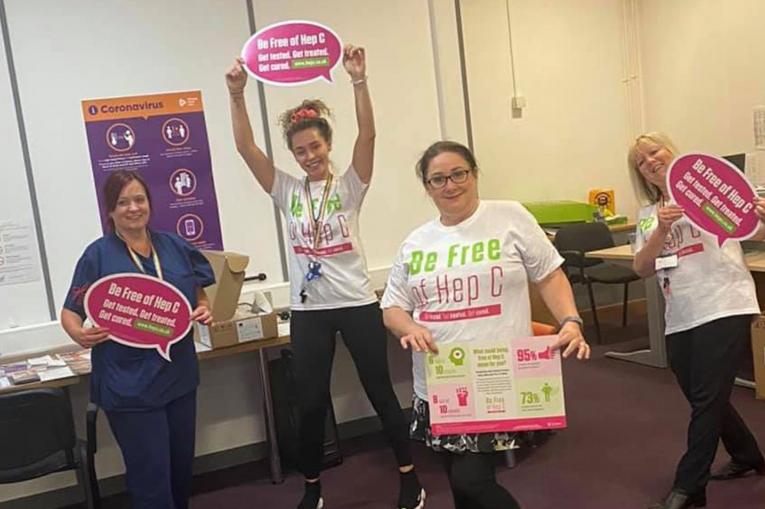Despite the challenges and pressures of these unprecedented times, coronavirus lockdowns and local restrictions, Change Grow Live St Helens is delighted to be celebrating the micro-elimination of hepatitis C (hep C) in their service.
This has been achieved in partnership with St Helens and Knowsley Teaching Hospital Trust, the Royal Liverpool and Broadgreen University Hospitals Trust and The Hepatitis C Trust. Our Service Manager Rachel Fance is full of praise for the whole team and the multiagency collaboration that enabled easy on-site access to hep C testing and treatment.
"Eliminating hep C has been an absolute mission of ours since 2017. The whole team has embraced the challenge of finding people who are positive, regularly testing and getting people involved in the agenda of keeping themselves well by turning up for treatment. The clinical team, Karen Assheton, our brilliant Health and Wellbeing Nurse, and Ruby Camacho, our fantastic Health Care Assistant, have been at the forefront of this effort supported by their colleagues, partners and most importantly expert peers spreading the word about the new treatment opportunities."
The behind-the-scenes processes that made this happen included meeting and planning with the Operational Delivery Network (ODN) for our area. ODNs are the regional bodies used by NHS England to support treatment around the country. Building upon a shared vision and our pre-existing relationship with the team from Whiston Hospital we ran a clinic on-site once a week, with additional drive days in the local Life Houses testing all the residents in one day and providing medication there and then.
What is micro-elimination?
Hep C is one of the most common blood-borne viruses in the country. Testing and treatments have improved a lot over the years, and most people with hep C can be cured with few or no side effects.
Micro-elimination is a new way of tackling hepatitis C in local areas. It uses a series of targets to make sure that people are being diagnosed and getting the treatment they need quickly and easily.
When we say an area has micro-eliminated hepatitis C, that means it has reached these targets:
- 100% of people using the service have been offered a hepatitis C test.
- 90% of these people have then been tested.
- 75% of people who were diagnosed with hepatitis C have started treatment.
NHS England set these micro-elimination targets in order to eliminate hepatitis C as a major health concern by 2025. We’ve been working with Gilead Sciences to reach the targets in Change Grow Live services all over the country. Thanks to a lot of hard work from the whole team, our St Helens service has become the third Change Grow Live service to micro-eliminate hepatitis C following Halton and Richmond services.

"We are delighted to have achieved micro-elimination, especially given the high rate of the disease prevalence three years ago. Coronavirus working arrangements only temporarily affected our efforts and the partnership used creativity and PPE to deliver this service safely. This is not the end of the story, it is just a milestone on our journey to eliminating hep C and finding the missing millions!"
Rachel Fance, Service Manager

Overcoming our biggest challenge
The biggest challenge was making sure everyone was able to get treated. We only had one day a week, so how could we make sure they would show up on the day?
From previous experience, we knew that people often missed clinics, for many reasons. So we used a system where we arranged lifts, often arranged in partnership with The Hepatitis C Trust, to actually pick people up and give them a lift to the onsite clinic, as well as a clinical van service to take the treatment to the person.
All of the partners contributed items to make up individualised packages for the people who use the hepatitis C service, including food, toiletries and small items of clothing. The whole-team approach was so important in building relationships with the people who required treatment. We couldn’t have made it work without the enthusiasm and determination of all involved.
What we learned
To any service working towards micro-elimination, my advice would be get everyone around the table at the very beginning. Make sure everyone knows what their part is, and when they need to do it.
Sitting down with everyone at the start to create a shared vision, personal ownership and a sense of excitement about the project really created an excellent platform for our success.
We created a ‘one-stop shop’ so people didn’t have to come in for lots of separate appointments. Instead, they came in for an hour, which could include an ultrasound scan of their liver; a nurse from the Whiston Hospital would do the blood testing; on occasion we had a Cephid machine to give instant access to Genotypes; and by the next month anyone who needed it would be in treatment. Because the clinics are running regularly, we can make sure that every team is free when they need to be, so we can plan ahead and make sure each week’s clinic is a success.
To anyone using one of our services, or considering getting tested, I would thoroughly recommend it. It’s quick and easy, and we’ll do everything we can to help you get the treatment you need.
Get in touch
If you’re interested in sharing learnings about hepatitis micro-elimination, or would like to find out more, you can email: [email protected].
Get tested
If you would like a free, quick test for hep C, speak to someone from the team at your service, and they’ll be happy to help.
Find out about hepatitis and how to get tested
Share this story:
